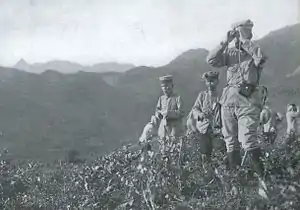First Army (Japan)
The Japanese 1st Army (第1軍, Dai-ichi gun) was an army of the Imperial Japanese Army. It was raised and demobilized on three occasions.
| Japanese First Army | |
|---|---|
 Japanese General Kuroki and his Chief of Staff Shigeta Fujii | |
| Active | September 1894 – September 1945 |
| Country | Empire of Japan |
| Branch | Imperial Japanese Army |
| Type | Infantry |
| Role | Corps |
| Nickname(s) | Otsu (乙, Second) |
| Engagements | First Sino-Japanese War Russo-Japanese War Second Sino-Japanese War World War II |
History
The Japanese 1st Army was initially raised during the First Sino-Japanese War from 1 September 1894 – 28 May 1895 under the command of General Yamagata Aritomo. It participated in all of the major battles of that conflict, and was demobilized at the successful end of that war.
It was revived for the Russo-Japanese War from 2 February 1904 – 9 December 1905 under the command of General Kuroki Tamemoto. Its forces were the first to land in Korea and Manchuria and it fought in most of the major campaigns of the war, including the Battle of Yalu River, Battle of Motien Pass, Battle of Liaoyang, Battle of Shaho, Battle of Sandepu, and Battle of Mukden. It was again demobilized at the end of that conflict.
The Japanese 1st Army was raised again on 26 August 1937 in Tianjin, China under the Japanese China Garrison Army. In addition to protecting the Japanese settlement at Tianjin, it served as a reinforcement to the newly formed Japanese Northern China Area Army following the Marco Polo Bridge Incident during the Second Sino-Japanese War. The 1st Army subsequently participated in various campaigns in North China under the operational command of the Japanese Northern China Area Army, including the North China Incident, Beiping–Hankou Railway Operation, and the Battle of Taiyuan before being demobilized at Taiyuan, Shanxi province after the end of World War II on 30 September 1945.
List of Commanders
Commanding officer
| Name | From | To | |
|---|---|---|---|
| 1 | Marshal Yamagata Aritomo | 1 September 1894 | 19 December 1894 |
| 2 | Marshal Nozu Michitsura | 19 December 1894 | 28 May 1895 |
| X | demobilized | 28 May 1895 | 2 February 1904 |
| 3 | Marshal Kuroki Tamemoto | 2 February 1904 | 9 December 1905 |
| X | demobilized | 9 December 1905 | 31 August 1937 |
| 4 | Lieutenant General Kiyoshi Katsuki | 26 August 1937 | 30 May 1938 |
| 5 | General Yoshijirō Umezu | 30 May 1938 | 7 September 1939 |
| 6 | Lieutenant General Yoshio Shinozuka | 7 September 1939 | 20 June 1941 |
| 7 | Lieutenant General Yoshio Iwamatsu | 20 June 1941 | 1 August 1942 |
| 8 | General Teiichi Yoshimoto | 1 August 1942 | 22 November 1944 |
| 9 | Lieutenant General Raishiro Sumida | 22 November 1944 | 30 September 1945 |
Chief of Staff
| Name | From | To | |
|---|---|---|---|
| 1 | Major General Ogawa Mataji | 1 September 1894 | 28 May 1895 |
| X | demobilized | 28 May 1895 | 2 February 1904 |
| 2 | Major General Fujii Shigeta | 2 February 1904 | 9 December 1905 |
| X | demobilized | 9 December 1905 | 26 August 1937 |
| 3 | Major General Gun Hashimoto | 26 August 1937 | 27 January 1938 |
| 4 | Major General Shōjirō Iida | 27 January 1938 | 9 November 1938 |
| 5 | Lieutenant General Senichi Kushibuchi | 9 November 1938 | 9 March 1940 |
| 6 | Major General Ryukichi Tanaka | 9 March 1940 | 2 December 1940 |
| 7 | Major General Hideyoshi Kusuyama | 2 December 1940 | 1 December 1941 |
| 8 | Lieutenant General Tadashi Hanaya | 1 December 1941 | 23 October 1943 |
| 9 | Major General Ichimaro Horike | 23 October 1943 | 16 December 1944 |
| 10 | Major General Michitake Yamaoka | 16 December 1944 | September 1945 |
References
- Jowett, Bernard (1999). The Japanese Army 1931-45 (Volume 2, 1942-45). Osprey Publishing. ISBN 1-84176-354-3.
- Madej, Victor (1981). Japanese Armed Forces Order of Battle, 1937-1945. Game Publishing Company. ASIN: B000L4CYWW.
- Marston, Daniel (2005). The Pacific War Companion: From Pearl Harbor to Hiroshima. Osprey Publishing. ISBN 1-84176-882-0.
External links
- Wendel, Marcus. "Axis History Factbook". Japanese 1st Army.
Notes
- The Japanese Army 1931-1945, Osprey Publishing, p.15